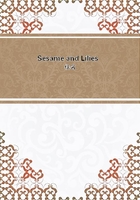
第30章
I think, however, if I now say briefly and clearly what I meant my hearers to understand, and what I wanted, and still would fain have, them to do, there may afterwards be found some better service in the passionately written text.
The first lecture says, or tries to say, that, life being very short, and the quiet hours of it few, we ought to waste none of them in reading valueless books; and that valuable books should, in a civilized country, be within the reach of every one, printed in excellent form, for a just price; but not in any vile, vulgar, or, by reason of smallness of type, physically injurious form, at a vile price. For we none of us need many books, and those which we need ought to be clearly printed, on the best paper, and strongly bound.
And though we are, indeed, now, a wretched and poverty-struck nation, and hardly able to keep soul and body together, still, as no person in decent circumstances would put on his table confessedly bad wine, or bad meat, without being ashamed, so he need not have on his shelves ill-printed or loosely and wretchedly-stitched books;for though few can be rich, yet every man who honestly exerts himself may, I think, still provide, for himself and his family, good shoes, good gloves, strong harness for his cart or carriage horses, and stout leather binding for his books. And I would urge upon every young man, as the beginning of his due and wise provision for his household, to obtain as soon as he can, by the severest economy, a restricted, serviceable, and steadily--however slowly--increasing, series of books for use through life; making his little library, of all the furniture in his room, the most studied and decorative piece; every volume having its assigned place, like a little statue in its niche, and one of the earliest and strictest lessons to the children of the house being how to turn the pages of their own literary possessions lightly and deliberately, with no chance of tearing or dog's ears.
That is my notion of the founding of Kings' Treasuries; and the first lecture is intended to show somewhat the use and preciousness of their treasures: but the two following ones have wider scope, being written in the hope of awakening the youth of England, so far as my poor words might have any power with them, to take some thought of the purposes of the life into which they are entering, and the nature of the world they have to conquer.
These two lectures are fragmentary and ill-arranged, but not, Ithink, diffuse or much compressible. The entire gist and conclusion of them, however, is in the last six paragraphs of the third lecture, which I would beg the reader to look over not once nor twice, (rather than any other part of the book,) for they contain the best expression I have yet been able to put in words of what, so far as is within my power, I mean henceforward both to do myself, and to plead with all over whom I have any influence, to do also according to their means: the letters begun on the first day of this year, to the workmen of England, having the object of originating, if possible, this movement among them, in true alliance with whatever trustworthy element of help they can find in the higher classes. After these paragraphs, let me ask you to read, by the fiery light of recent events, the fable at p. 170, and then paragraphs 129-131 ; and observe, my statement respecting the famine at Orissa is not rhetorical, but certified by official documents as within the truth. Five hundred thousand persons, ATLEAST, died by starvation in our British dominions, wholly in consequence of carelessness and want of forethought. Keep that well in your memory; and note it as the best possible illustration of modern political economy in true practice, and of the relations it has accomplished between Supply and Demand. Then begin the second lecture, and all will read clear enough, I think, to the end; only, since that second lecture was written, questions have arisen respecting the education and claims of women which have greatly troubled simple minds and excited restless ones. I am sometimes asked my thoughts on this matter, and I suppose that some girl readers of the second lecture may at the end of it desire to be told summarily what I would have them do and desire in the present state of things. This, then, is what I would say to any girl who had confidence enough in me to believe what I told her, or to do what Iasked her.